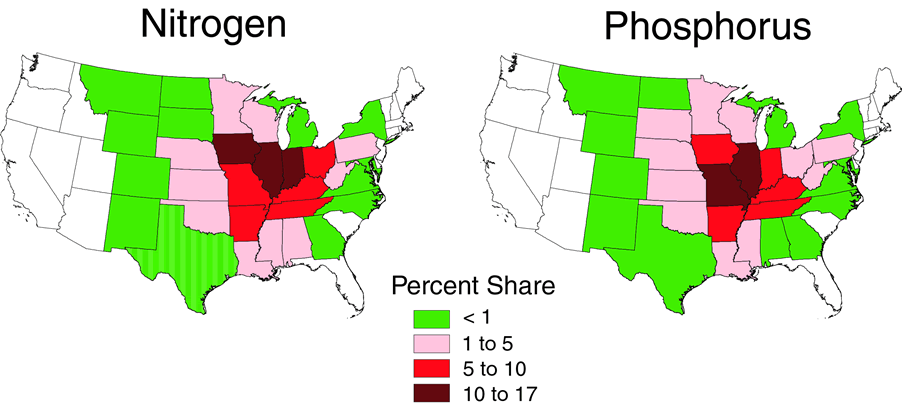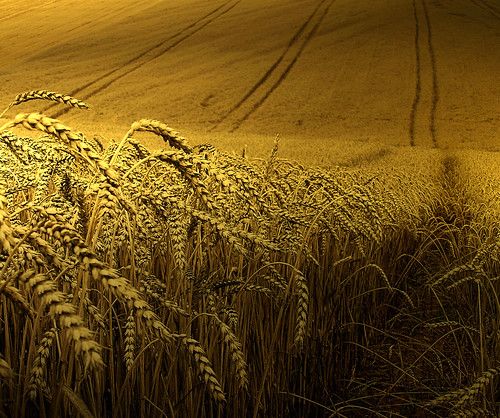Wow- It has definitely been too long since my last post! Finals preparation consumed my entire month of December, so I'll blame it on that.
Each Fall on the St.Paul campus of the University of Minnesota campus the leaves turn red, and conversations turn sour about professors, homework or classes.
Of these... ONE still sticks in my head. "Apparently there is a "dead" zone in Louisiana, and I'm supposed to care? We live in Minnesota, this doesn't matter."
I have never taken AGRO 1101- Biology of Plant Food Systems, but many students that are agricultural majors can take it as an alternative to the General Biology requirement. To my knowledge, one of the first topics the students cover is related to the impacts of agriculture on algal blooms and eutrophication in the Gulf of Mexico. As noted earlier, I have seen it on Facebook, and heard it in conversations about the "irrelevance" of this topic for agriculture students in Minnesota.
Let's bridge this gap, and reveal some quick facts and my own personal beliefs on the topic.
- It is SO relevant
- A trite statement like "it doesn't matter", simply belittles a problem that is much closer to home than we may think.
- FACT: This phenomenon is not exclusive to the Gulf of Mexico. Dead zones occur worldwide, but it is SO relevant to us in the United States to discuss the Gulf of Mexico because it is connected to our land, the Mississippi River empties into it and it is part of our recreation & fisheries industry.
- Whether you are from: Minnesota or Massachusetts, New Mexico or New Jersey, you can see Alaska from your house or Cuba- it matters. Speaking of New Jersey, did you know the Gulf of Mexico dead zone is the size of New Jersey? Sometimes (I think all the time) opening our mind to a new perspective, idea that is different than our own mental set is good. If we spent the rest of our lives stuck in the snowglobe of small-town USA (or even St Paul), we would never care about anything other than where we came from. You can still survive like this, no doubt. However, complacent attitudes will never seek to take action, make change and work towards improvement. This whole idea isn't about the dead zone, but about a general attitude in our culture.
- What is agriculture's role?
- To say that agriculture has not been blamed for the dead zone in the Gulf of Mexico would be a lie. A recent documentary released about the dead zone, Troubled Waters, presents some interesting points about Minnesota agriculture's role in the development of hypoxic water. If you haven't seen it yet- do it. The University of Minnesota, for example has several places and venues to watch this. Again- as stated in my previous blog "Seek to understand, then to be understood"
- It is no coincidence that the mighty Mississippi River is the central hub of the Midwest agricultural industry, as well as several others. This water body allows trade, irrigation and a natural movement of sediment, fish and other invertebrates. St Paul, Minneapolis, St.Louis, Quad Cities, Memphis and New Orleans are all major metropolitan areas located along the rivers for this very reason. Now back to my original theme about agriculture's role... I'll keep it quick.
- Agriculture is not a perfect system or industry. Fertilizers: nitrogen, phosphorous, potassium, ammonia, liquid manure ... they are all commonly applied to fields. Guess what? Sometimes these compounds are applied excessively, or with out precision and the result is a higher concentration of nutrients in the soil than the corn or soybean plant needs. These compounds, especially in a tile drainage system, will mix with water and runoff into the nearest river system- which more than likely will end up in the Mississippi River. On top of that, before and after harvest large quantities of soil are lifted into the air and displaced. While "no till" practices aim to prevent this erosion of soil, it is not conventional in the industry. This sediment, joins the fertilizer on it's trip down the river and meets up with other sources from across the United States, where it sequesters, promotes algal blooms and degrades the oxygen content of the Gulf of Mexico
- * It is encouraging to know that our industry is realizing the gravity of such practices, and the effects it has on the environment as well as our image. We are making changes.
- CONNECT
- FACT: This Mississippi River Basin is composed of 31 states. This issue is not just directed towards Minnesota, but every state that has a river that flows in the Mississippi (Ohio River, Missouri River) That's over half of the Lower-48! We are all apart of and connected to this problem.
- This issue is not solely because of agriculture. For example: Think about the number of impermeable surfaces we have created in our cities, especially in metropolitan areas mentioned earlier. These high traffic cities have completely removed the natural landscape and introduced extensive impermeable surfaces that promote the concentration and speed of contaminated water (gasoline, industrial waste, pesticides,trash, septic waste, sediment) in storm drains that empty directly into the Mississippi River. Additionally, the building of dams has disrupted the river ecosystem by deliberately raising and lowering water to unnatural levels, creating unnatural lakes, changing water temperatures and blocks the flow of sediments and nutrients resulting in eutrophication.
- It's not an industry problem- it's OUR problem.
- Finally: In my own mind, every issue is universal and deserves some type of understanding by each of us- otherwise we will not learn from our, or other's mistakes. It's a part of being a citizen of the United States, and the global population.
**TRY IT
Create your own belief statement about the Dead Zone in the Gulf of Mexico (or any issue). Let's say you "believe that agriculture is not to blame for __________" Then, write a paragraph, or just research and find 5 sources that prove your belief wrong. This isn't a test to change our values, because our values must be upheld, especially in agriculture. It is a merely a way to gain an understanding of an outside view. LEARN from it.
If you have questions, concerns, suggestions for future blogs or simply disagree- just post a comment below! Thanks-




